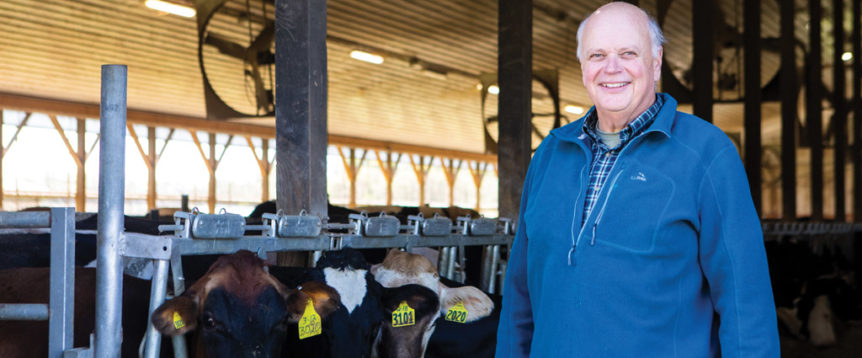If there was a visual for the word “pastoral,” it might just be Sunset Lake Farm in South Burlington, Vermont. Owned by Tom Bellavance—whose father and grandfather were both dairy farmers—the farm is home to approximately 1,000 cows. Its 1,700 acres are spread across three locations in the Lake Champlain Basin, with some of the fields less than a stone’s throw from Lake Champlain. So, to Bellavance, it’s a no-brainer for farm practices to have an eye to water quality, among other things.
“Water quality is very important to us, because the drinking water for my kids and grandchildren comes out of Lake Champlain,” Bellavance says. In fact, he explains, the general farm philosophy boils down to four things that share equal billing: welfare of animals, welfare of employees, product safety and quality, and land and water. “If all four are taken care of, that will take care of the farm. I am a firm believer that good environmental practices equal good economic practices,” he says.
Supporting these principles has been made easier through the farm’s partnership with Ben & Jerry’s. Sunset employs the ice cream company’s Milk with Dignity standard, an independent, farmworker-led human-rights initiative designed to ensure healthy working conditions for employees working on dairy farms in the Northeast United States. The program audits Sunset each year and conducts interviews with employees to make sure healthy work conditions are in place. “Milk with Dignity really helps with the communication between employee and employers and employee to employee,” says Bellavance, adding that it also has led to great employee retention.
The farm is also part of Ben & Jerry’s Caring Dairy program, which helps dairy farms maintain a focus on environmental stewardship. Caring Dairy promotes the use of regenerative agricultural practices, with a focus on building soil health and improving water quality and biodiversity on farms. Bellavance says that the farm staff has been monitoring improvements and measuring soil nutrients together with researchers from nearby Cornell University, as well as checking water runoff to make sure they’re doing their part to keep Lake Champlain clean. They’ve also set aside 10 percent of total acres for designated biodiversity areas, including wildlife corridors.
Not only are these changes better for the environment, Bellavance says, but the land itself has become more productive. “We have seen probably a 20 percent increase in productivity, and as weather events happen more frequently, we are seeing our crops less affected by it, whether that’s too much rain or not enough,” he explains.
All of this, he says, is a good message for Ben & Jerry’s to communicate to consumers. “Consumers want to know how that food is produced, how were the people helping treated and how is that land treated. It goes back to one of my main focuses being product safety and quality, because for food to be good quality, it has to be produced on land that is well cared for. Quality food, especially with a dairy product, has to come from healthy, robust cows.” Bellavance adds: “You can see how it’s all intertwined—animals, employees, product quality and the environment—one is not more important or less important than another.”

